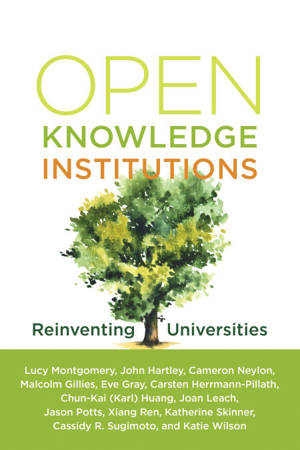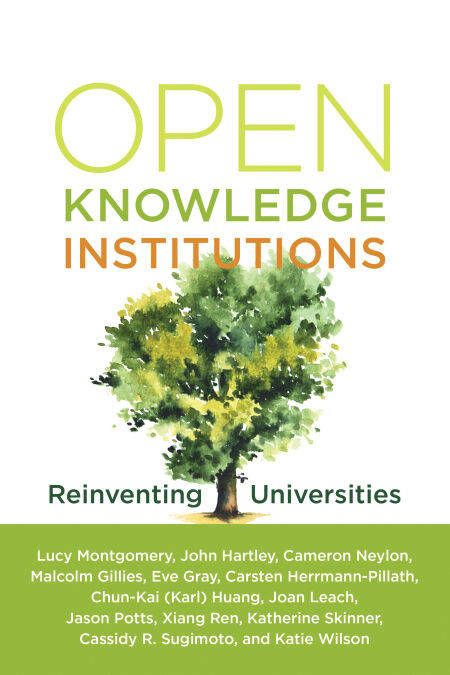
- Afhalen na 1 uur in een winkel met voorraad
- Gratis thuislevering in België vanaf € 30
- Ruim aanbod met 7 miljoen producten
- Afhalen na 1 uur in een winkel met voorraad
- Gratis thuislevering in België vanaf € 30
- Ruim aanbod met 7 miljoen producten
Zoeken
Open Knowledge Institutions E-BOOK
Reinventing Universities
Lucy Montgomery, John Hartley, Cameron Neylon, Malcolm Gillies, Eve Gray
E-book | Engels
€ 34,49
+ 34 punten
Omschrijving
The future of the university as an open knowledge institution that institutionalizes diversity and contributes to a common resource of knowledge: a manifesto.
In this book, a diverse group of authors—including open access pioneers, science communicators, scholars, researchers, and university administrators—offer a bold proposition: universities should become open knowledge institutions, acting with principles of openness at their center and working across boundaries and with broad communities to generate shared knowledge resources for the benefit of humanity. Calling on universities to adopt transparent protocols for the creation, use, and governance of these resources, the authors draw on cutting-edge theoretical work, offer real-world case studies, and outline ways to assess universities’ attempts to achieve openness.
Digital technologies have already brought about dramatic changes in knowledge format and accessibility. The book describes further shifts that open knowledge institutions must make as they move away from closed processes for verifying expert knowledge and toward careful, mediated approaches to sharing it with wider publics. It examines these changes in terms of diversity, coordination, and communication; discusses policy principles that lay out paths for universities to become fully fledged open knowledge institutions; and suggests ways that openness can be introduced into existing rankings and metrics. Case studies—including Wikipedia, the Library Publishing Coalition, Creative Commons, and Open and Library Access—illustrate key processes.
In this book, a diverse group of authors—including open access pioneers, science communicators, scholars, researchers, and university administrators—offer a bold proposition: universities should become open knowledge institutions, acting with principles of openness at their center and working across boundaries and with broad communities to generate shared knowledge resources for the benefit of humanity. Calling on universities to adopt transparent protocols for the creation, use, and governance of these resources, the authors draw on cutting-edge theoretical work, offer real-world case studies, and outline ways to assess universities’ attempts to achieve openness.
Digital technologies have already brought about dramatic changes in knowledge format and accessibility. The book describes further shifts that open knowledge institutions must make as they move away from closed processes for verifying expert knowledge and toward careful, mediated approaches to sharing it with wider publics. It examines these changes in terms of diversity, coordination, and communication; discusses policy principles that lay out paths for universities to become fully fledged open knowledge institutions; and suggests ways that openness can be introduced into existing rankings and metrics. Case studies—including Wikipedia, the Library Publishing Coalition, Creative Commons, and Open and Library Access—illustrate key processes.
Specificaties
Betrokkenen
- Auteur(s):
- Uitgeverij:
Inhoud
- Aantal bladzijden:
- 176
- Taal:
- Engels
Eigenschappen
- Productcode (EAN):
- 9780262365161
- Verschijningsdatum:
- 2/08/2021
- Uitvoering:
- E-book
- Beveiligd met:
- Adobe DRM
- Formaat:
- ePub

Alleen bij Standaard Boekhandel
+ 34 punten op je klantenkaart van Standaard Boekhandel
Beoordelingen
We publiceren alleen reviews die voldoen aan de voorwaarden voor reviews. Bekijk onze voorwaarden voor reviews.







